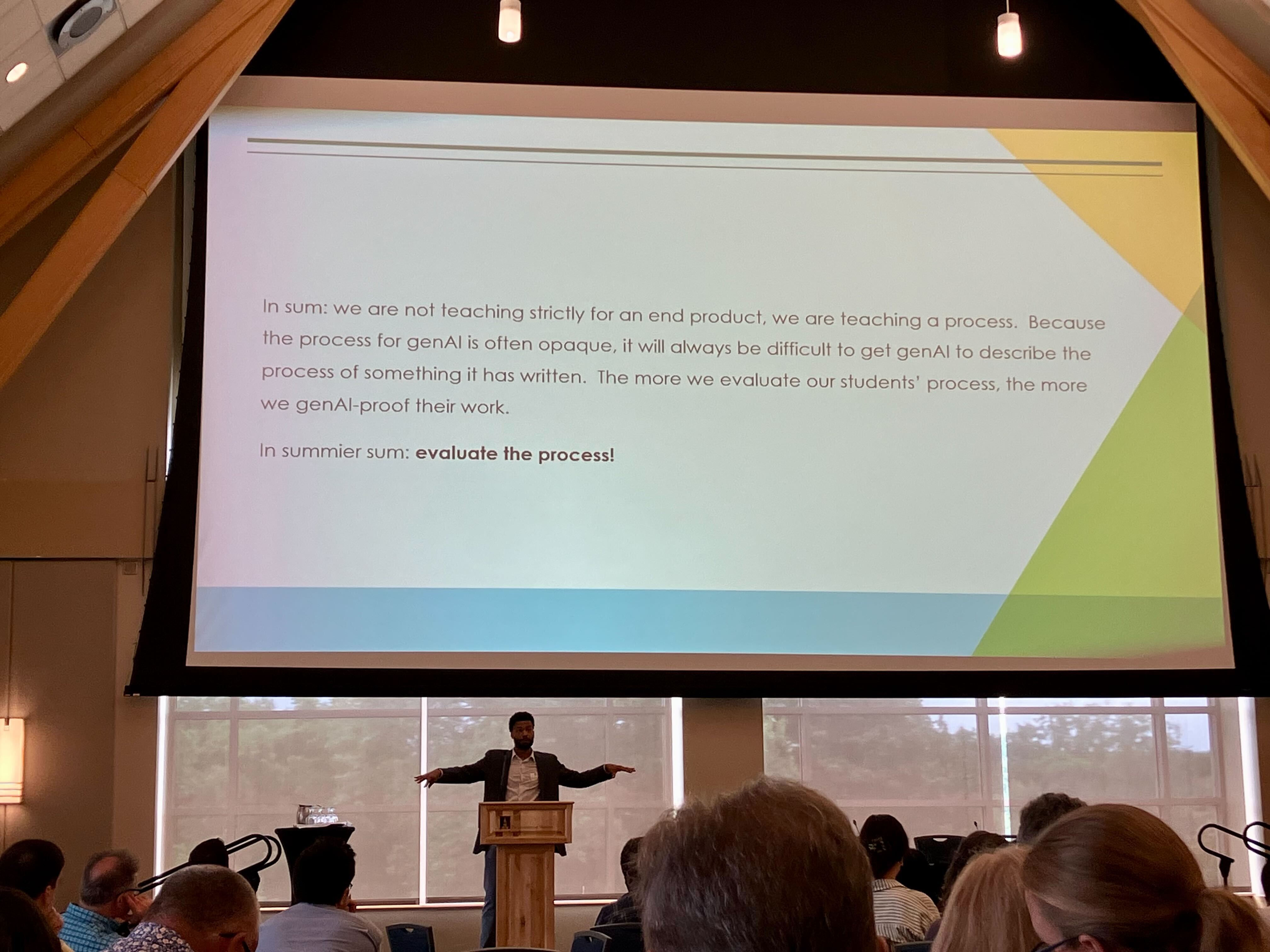Large

Randall Harp, SOCKS, CO-PI, Keynote Speaker at Seventh Annual Campus Wide Faculty Event
“Academia and the Third Wave of Online Content”
Dr. Randall Harp, Associate Professor, Department of Philosophy UVM College of Arts and Sciences, and Co-PI for VT EPSCoR’s RII Track-1 award, Harnessing the Data Revolution for Vermont: The Science of Online Corpora, Knowledge, and Stories (SOCKS), served as Keynote Speaker for the seventh annual campus wide faculty event. His keynote abstract is provided below. Dr. Pablo Bose, Professor, Department of Geography and Geosciences UVM College of Arts and Sciences, and SOCKS Social Team Lead, introduced Dr. Harp and facilitated a Q&A session immediately following his presentation. The event was held on Monday, August 21, 2023 at the Grand Maple Ballroom, Dudley H. Davis Center.
“Academia and the Third Wave of Online Content”
We can consider the first wave of online content to be the ability of users around the world to easily find and access online content through search and indexing tools (Google etc.), and we can consider the second wave of online content to be the ability of users to easily share content (whether found or user-generated) with other users around the world in communities of whatever size (social media etc.). I suggest that we are now in a third wave of online content, which is marked by the ability of users to generate persuasive-seeming content (text, still images, video images, audio, music, data analysis, etc.) on arbitrary topics. The first two waves of online content posed serious ethical and epistemic challenges that we have not yet fully solved. The same is true of the third: generative AI tools will change many aspects of society, and the university will be particularly affected given its roles as one of the preeminent knowledge creation, knowledge dissemination, and knowledge certification institutions in society.
This talk will provide a lens through which to understand the challenges and transformations that generative AI tools will pose. I will provide a brief overview of what AI is, how AI works, and how generative AI is different from other kinds of AI tools. I will briefly discuss background ethical issues surrounding our development and use of generative AI tools, but I will focus on the ethical and epistemic challenges of generative AI tools for knowledge creation, knowledge dissemination, and knowledge certification and accreditation in a university context. In other words, how should faculty rethink our jobs given the increasing availability of generative AI tools (both for our students and for us)?
Dr. Randall Harp, Associate Professor, Department of Philosophy UVM College of Arts and Sciences, and Co-PI for VT EPSCoR’s RII Track-1 award, Harnessing the Data Revolution for Vermont: The Science of Online Corpora, Knowledge, and Stories (SOCKS), served as Keynote Speaker for the seventh annual campus wide faculty event. His keynote abstract is provided below. Dr. Pablo Bose, Professor, Department of Geography and Geosciences UVM College of Arts and Sciences, and SOCKS Social Team Lead, introduced Dr. Harp and facilitated a Q&A session immediately following his presentation. The event was held on Monday, August 21, 2023 at the Grand Maple Ballroom, Dudley H. Davis Center.
“Academia and the Third Wave of Online Content”
We can consider the first wave of online content to be the ability of users around the world to easily find and access online content through search and indexing tools (Google etc.), and we can consider the second wave of online content to be the ability of users to easily share content (whether found or user-generated) with other users around the world in communities of whatever size (social media etc.). I suggest that we are now in a third wave of online content, which is marked by the ability of users to generate persuasive-seeming content (text, still images, video images, audio, music, data analysis, etc.) on arbitrary topics. The first two waves of online content posed serious ethical and epistemic challenges that we have not yet fully solved. The same is true of the third: generative AI tools will change many aspects of society, and the university will be particularly affected given its roles as one of the preeminent knowledge creation, knowledge dissemination, and knowledge certification institutions in society.
This talk will provide a lens through which to understand the challenges and transformations that generative AI tools will pose. I will provide a brief overview of what AI is, how AI works, and how generative AI is different from other kinds of AI tools. I will briefly discuss background ethical issues surrounding our development and use of generative AI tools, but I will focus on the ethical and epistemic challenges of generative AI tools for knowledge creation, knowledge dissemination, and knowledge certification and accreditation in a university context. In other words, how should faculty rethink our jobs given the increasing availability of generative AI tools (both for our students and for us)?